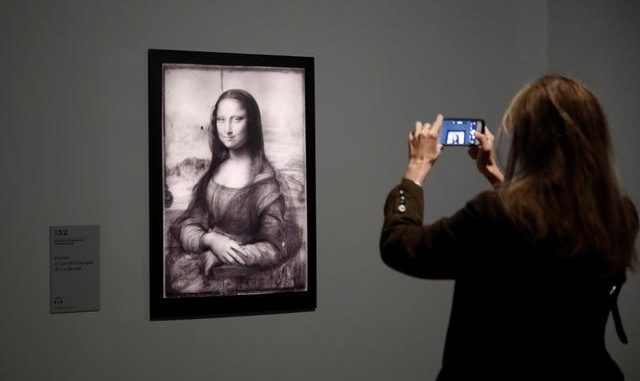
France’s Louvre museum, home to Leonardo da Vinci’s Mona Lisa, is putting the final touches to one of the biggest ever exhibitions of the Italian master’s work with the presence of the world’s most expensive painting agonizingly unresolved.An infrared reflectography of the painting “Mona Lisa” by Leonardo da Vinci is pictured during a press visit of the “Leonardo da Vinci” exhibition to commemorate the 500-year anniversary of his death at the Louvre Museum in Paris, France, October 20, 2019. REUTERS/Benoit Tessier
The Louvre has assembled more than 160 paintings, sculptures, letters and drawings from the Renaissance era in an exhibition to mark the 500th anniversary of the Italian master’s death.
Whether Salvator Mundi, a painting attributed to da Vinci and sold by auctioneers Christie’s in 2017 for $450 million, and believed by many art experts to be in the Gulf, will be part of the show remains to be seen.
Louvre executives have requested its inclusion and still hope it will arrive for the show, giving an extra frisson of interest in the runup to its opening.
Da Vinci left his native Italy when his patron died and spent his last years in France as the guest of the French monarch, until he died in May 1519 at the Loire Valley chateau that had become his home.
The exhibition, which opens on Thursday Oct. 24, shows 10 of the paintings now attributed to da Vinci, including those kept in the Louvre — Saint Anne, Saint John the Baptist, The Virgin of the Rocks and La Belle Ferronnière — and works lent from other institutions.
Last week a Venetian judge authorized the loan of a few of da Vinci’s drawings, including the famous “Man of Vitruve”, which will be shown for two months only in Paris due to its fragility.
Specialists disagree on the exact number of works that can be attributed to the artist, with some putting the figure at 14 and others saying it is 17.
The da Vinci exhibition includes two dozen drawings lent by Queen Elizabeth II, along with paintings and sculptures. Some of the works are by Da Vinci himself, while some are by other artists and are there to put the Italian maestro’s work into context.
The exhibition also features infra-red imaging of paintings by da Vinci, revealing the layers of work that lie underneath the finished picture, so providing a glimpse of his working methods.
“Leonardo da Vinci paints very slowly. Each painting is a long improvement of shape and content”, said Vincent Delieuvin, conservator of the Louvre Paintings department.
Diplomatic frictions had cast a shadow over the organization of the Paris show, with former Italian Prime minister Matteo Salvini saying pointedly that da Vinci was Italian, not French.
When his patron Giuliano de Medici died, da Vinci left Italy for France at the invitation of French king François I. Appointed “First Painter, Engineer and Architect to the King”, the aging maestro settled at the Château du Clos Lucé, near the royal residence of Amboise.
The Mona Lisa, his most renowned work, has hung at the Louvre since the French Revolution and is viewed by around 30,000 visitors every day. That painting is not part of the exhibition.
The museum expects the da Vinci exhibition to have attracted at least half a million visitors by the time it closes on Feb. 24.
Reporting by Elizabeth Pineau; Edited by Christian Lowe and David Holmes
PARIS (Reuters) –
